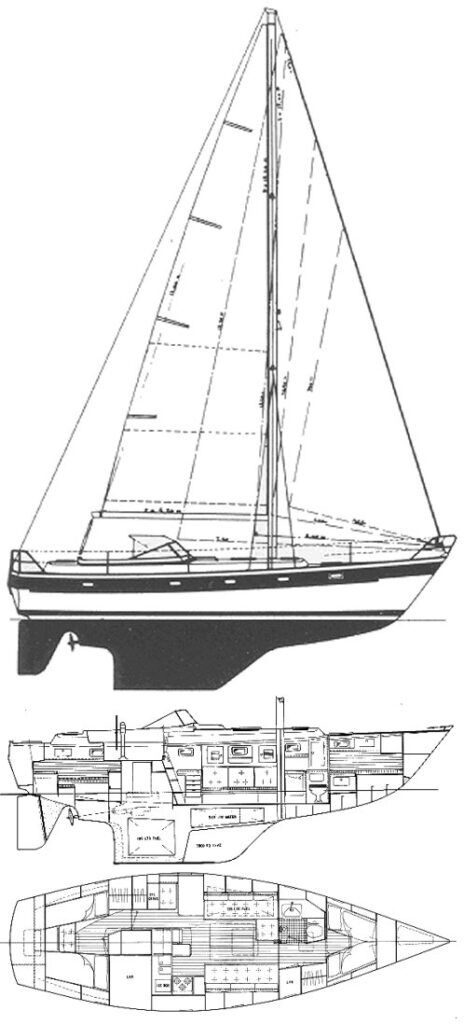The Hallberg-Rassy 382, produced by the renowned Swedish builder Hallberg-Rassy from 1984 to 1992, is a robust and comfortable cruising yacht designed for serious voyaging. Representing the culmination of a long collaboration, the 382 was the final design penned by the celebrated Swedish naval architect Olle Enderlein for the yard, in conjunction with Christoph Rassy. Known for its solid construction and seaworthy characteristics, this model offered enhanced sailing performance compared to its predecessors while maintaining the high standards of comfort and safety synonymous with the Hallberg-Rassy brand. A total of 116 units were built during its production run.
Hallberg-Rassy 382 Information, Review, Specs

- Make
- Hallberg-Rassy
- Model
- 382
- Number Built
- 116
- Production Year(s)
- 1984 - 1992
The Hallberg-Rassy 382 was introduced in 1984 as a significant modernization, featuring completely new, more contemporary hull lines that incorporated eight additional years of design experience. This marked a pivotal moment, as it was the last Hallberg-Rassy model to be designed by Olle Enderlein and notably the last to feature an encapsulated keel, a hallmark of the company's early design philosophy emphasizing strength and durability. The builder's ethos, established by Harry Hallberg and Christoph Rassy, focused on creating yachts with robust, heavily built fiberglass hulls for consistency and longevity. Uniquely among Enderlein's designs, the 382 features cored hulls in horizontal areas like the deck and cockpit floor, utilizing Divinycell for structural integrity. While originally fitted with a Volvo Penta MD30 engine, later versions of the 382 were equipped with a Volvo Penta MD22P.
Sailing Performance and Handling
With a sail area to displacement ratio of approximately 16.6, the Hallberg-Rassy 382 is positioned as a capable cruiser rather than a light-air racer, suggesting good all-around performance without being overly sensitive to light winds. Its ballast to displacement ratio of around 0.43 indicates a stiff and stable yacht, well-equipped to stand up to stronger winds and provide a comfortable motion in a seaway. The displacement to length ratio of approximately 292 further categorizes it as a moderate-to-heavy displacement cruiser, reinforcing its reputation for solid, stable performance. The 382 was designed to offer improved sailing characteristics over previous models, all while upholding the Hallberg-Rassy tradition of comfortable and seaworthy handling. Its fin keel and skeg-hung rudder configuration provide excellent directional stability, a valued trait for offshore cruising.
Accommodations and Layout
While specific interior headroom details are not readily available in structured data, the interior layout of the Hallberg-Rassy 382 maintains the well-proven principles of Hallberg-Rassy's center-cockpit designs, known for their functionality and comfort. Hallberg-Rassy interiors are characterized by exquisite Swedish craftsmanship, utilizing high-quality mahogany and other fine woods to create warm, inviting, and practical living spaces. Descriptions and blueprints suggest a typical arrangement that includes a forward V-berth cabin, a spacious saloon, a well-appointed galley, a navigation station, and an owner's aft cabin, often featuring a private head. The emphasis is on ample storage, good ventilation, and durable finishes suitable for extended periods aboard.
Owner's Perspectives
Owners of the Hallberg-Rassy 382 consistently praise its solid construction and comfortable motion, affirming its capability as a true bluewater cruiser. Many owners consider their boats a "home" due to their robust design and liveability. The vessel's seaworthiness and overall build quality are frequently highlighted as significant strengths. While Hallberg-Rassy yachts are generally well-regarded, common maintenance considerations, typical of boats of this vintage, include the potential need for refurbishing or replacing the teak deck, as noted by some owners. Owners often engage with active online communities and owner associations, which serve as valuable resources for sharing experiences and expert advice.
Measurements
Construction & Hull
- Construction Material
- Fiberglass (Solid)
- Hull Type
- Monohull Sailboat
- Keel Type
- Fin
- Rudder
- 1x Skeg-Hung
- Ballast
- 8598 lbs (Lead)
- Displacement
- 19841 lbs
- Water Capacity
- 153 gal
- Fuel Capacity
- 89 gal
Engine
- Engine Make
- Volvo Penta
- Engine Model
- MD30
- Engine Type
- —
- Engine HP
- 62
- Engine Count
- 1
- Drive Type
- —
- Fuel Type
- Diesel
Rig & Sails
- Rig Type
- Masthead Sloop
- P (Main Luff)
- -
- E (Main Foot)
- -
- I (Foretriangle Height)
- -
- J (Foretriangle Base)
- -
- Forestay Length (est)
- -
- Main Sail Area
- -
- Foretriangle Sail Area
- -
- Total Sail Area (Reported)
- 758.85 sqft
- Total Sail Area (Calc)
- -
Dimensions
- LOA
- 38.12 ft
- LWL
- 31.17 ft
- Beam
- 11.94 ft
- Draft
- 6.04 ft
- Max Headroom
- -
- Air Draft
- 54.13 ft
Calculations
- Hull Speed
- 7.48 kn
- Pounds per Inch Immersion
- 1